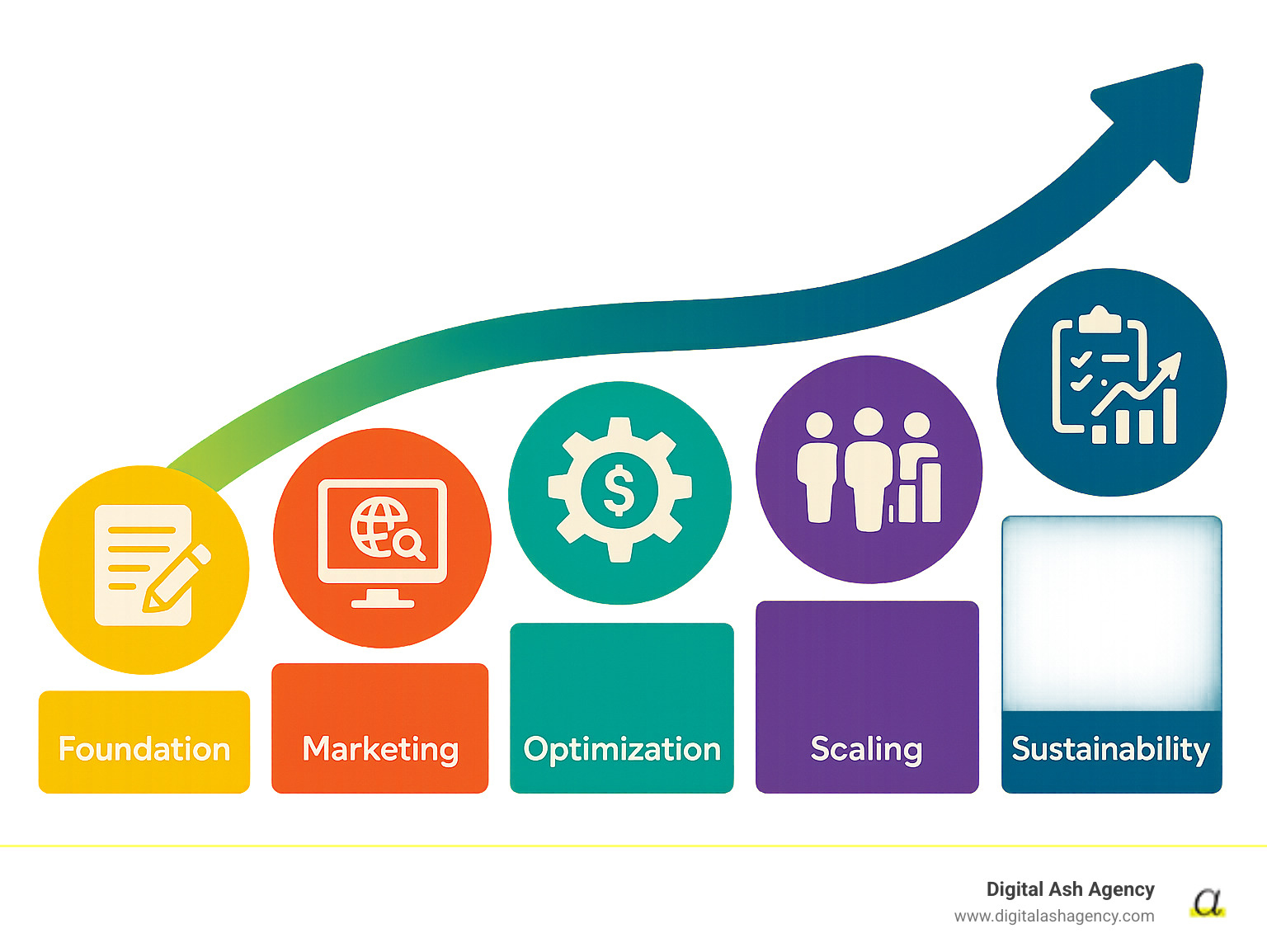
Why Growing Your Private Practice Requires More Than Clinical Excellence
To grow private practice success, you need a strategic blend of clinical expertise and business acumen. This guide covers the essentials:
- Foundation - Clear vision, ideal client, and legal structure.
- Digital Presence - A professional website and local SEO.
- Marketing Strategy - Targeted outreach across multiple channels.
- Operations - Streamlined systems and financial management.
- Scaling - Strategic expansion while maintaining quality care.
The private practice landscape is evolving. With economic shifts and the rise of mobile search in the United States, your growth strategy must be digitally savvy and financially resilient.
Success stories—like a therapist growing from 5 to 22 clients in 3 months, or a practice expanding to 40 therapists and 30,000 annual sessions—don't happen by accident. They result from treating practice growth as seriously as patient care.
Many practitioners face obstacles like non-compete agreements, crowded markets, and the struggle to balance clinical work with business development. Fortunately, proven strategies can overcome these challenges.
I'm Ashley Gay, a branding expert who helped my physician husband grow his practice to nearly $1 million in its first year, despite a non-compete. My approach uses strategic marketing to build sustainable growth systems within legal constraints.

Laying the Foundation: Strategy and Specialization
To grow private practice success, you need a solid foundation. This starts with a clear strategic plan, beginning with your "why"—your driving purpose. This purpose will guide your decisions and keep you aligned with your core values as you expand.
Next, set SMART (Specific, Measurable, Achievable, Relevant, Time-bound) goals to define your trajectory, whether you're aiming for incremental growth or rapid scaling.
Establishing the correct legal structure is paramount for protecting your assets. In the United States, therapists often choose an LLC, PLLC, or a Professional Corporation. An LLC or PLLC can shield you from business debts, while a Professional Corporation may be required by your state. Always consult a legal professional to choose the right entity for your practice.
For more guidance, explore our Business Plan for Healthcare resources.
Identifying Your Ideal Client and Niche
Defining who you want to serve is critical. This goes beyond demographics to psychographics—their values, interests, and challenges. Creating detailed client personas helps you understand their needs and tailor your services and marketing directly to them.
The power of niching down is immense. While it seems counterintuitive, specializing in a niche you're passionate about brands you as an expert. For example, a therapist might focus 75% of their practice on a specific issue like compulsive behaviors, which attracts ideal clients and establishes authority. As your reputation grows, other clients will seek you out. Trying to be everything to everyone often means you reach no one.
Expertise means having considerable knowledge and experience honed over time, not just attending a weekend workshop. For more on this, see our Branding for Doctors guide.
Understanding the Competitive Landscape
To thrive, you must understand your market. Conduct a competitor analysis to identify their services, market position, and unique selling propositions (USPs). This helps you find market gaps—underserved populations or unmet needs—and define your own USP that gives clients a compelling reason to choose you.
Market demand forecasting helps you anticipate future trends. Stay informed on population data, new technologies, and economic indicators, as these factors can influence public spending on mental health services and ensure your practice remains relevant.
Building Your Digital Front Door: The Essential Practice Website
Your website is your most dedicated team member, working 24/7 to make a great first impression. Before a potential client ever meets you, they've formed an opinion based on your site. This digital first impression can make or break your ability to grow private practice clientele.
Crucially, more Americans now search Google on their phones than on computers, so your website must be mobile-friendly. Furthermore, research shows people scan only about 28% of a webpage, so your content must be concise and impactful.

Key Elements of a High-Converting Therapy Website
A website that converts visitors into clients builds trust quickly and makes the next step obvious. It should feel like a warm, professional, and comfortable space.
- Professional Headshots: Use your smartphone's portrait mode in natural light to create a warm, approachable photo. This builds an instant connection.
- Compelling "About Me" Page: This is often the most visited page after your homepage. Share your story and why you became a therapist, not just your credentials.
- Clear Service Descriptions & Pricing: Eliminate confusion and anxiety for vulnerable clients by being specific about your services and upfront about your rates.
- Visible Contact Information: Make your phone number and a simple contact form impossible to miss on every page. Don't make people hunt for ways to reach you.
- Clear Call-to-Action (CTA) Buttons: Use specific, encouraging phrases like "Schedule Your Consultation" instead of generic buttons like "Click Here."
For more tips, see our guide on 7 Landing Page Mistakes That Kill Conversions.
Getting Found: Directories and Local Presence
A great website is useless if no one can find it. Online directories act as digital billboards for your practice.
- Google Business Profile: This is your top priority. Optimizing this free tool dramatically increases your visibility in local searches like "therapist near me."
- Bing Places: A worthwhile investment of time to capture searches on another major platform.
- Psychology Today: A go-to resource for many Americans seeking therapy. A well-crafted profile can generate significant leads.
- Good Therapy: Another valuable platform for connecting with clients seeking quality mental health care.
- Niche-Specific Directories: If you have specialized training (e.g., in EFT), list yourself in relevant directories like the EFT practitioners directory.
Consistent, professional profiles across all platforms are key to cohesive branding and attracting clients.
Activating Growth: Digital Marketing to Grow Your Private Practice
Gone are the days when word-of-mouth was enough to grow private practice success. Today's clients find therapists on Google and social media. The practices that thrive meet potential clients where they are: online. Digital marketing for therapists isn't about being everywhere; it's about a strategic, authentic approach that builds relationships at scale.

Your online presence should feel as warm and helpful as your therapy room. It works 24/7, answering questions and offering hope. For specialized insights, see our Digital Marketing for Doctors guide.
Mastering Search Engine Optimization (SEO) for Therapists
When someone searches "anxiety therapist near me," SEO ensures they find you. For therapists, local SEO is your best friend. Start by optimizing your Google Business Profile—your digital storefront.
Keyword research is about understanding your clients' language. They might search for "couples counseling" or "relationship help" for the same service. Use these terms naturally in your website's titles, headings, and content. Remember to write for humans first, search engines second.
Blogging is your secret weapon. Writing about topics like "5 Signs It's Time for Couples Therapy" transforms you from a listing into a trusted resource. Each post improves your SEO and helps potential clients before they even meet you. Even one hour a month dedicated to blogging can make a huge difference. If you're struggling to rank, our guide Why Your Website Isn't Ranking on Google can help.
Leveraging Social Media and Paid Advertising
Social media for therapists is about building genuine community connections. Choose platforms where your ideal clients spend time, like LinkedIn for professionals or Facebook for parents. Your content should be a helpful conversation. Share insights, destigmatize therapy, and offer practical tips. Balance educational content with glimpses of your personality, while always maintaining professional boundaries.
Paid advertising offers precision targeting. Google Ads can put you in front of people actively searching for your services in your area. Facebook Ads let you reach people based on specific demographics or life events. The best part is measurability; you can track your return on investment and refine your strategy to ensure every dollar is working for your practice. For more ideas, explore our Healthcare Advertising Ideas.
From Consultation to Client: Optimizing Your Intake Process
Once marketing brings in a lead, the next step is converting that interest into a therapeutic relationship. Your consultation process is the bridge. The person calling is often vulnerable, so your ability to create immediate rapport through empathy and active listening is crucial.
Prepare thoughtful responses to common concerns, especially about fees. Help them understand the value of therapy. Develop a structured follow-up system for those who aren't ready to commit immediately; a gentle email or call can capture clients who were initially hesitant. Your intake process should feel seamless and reassuring, changing curious visitors into committed clients.
Optimizing for Sustainability: Systems, Finance, and Operations
As you grow private practice, administrative efficiency is key to avoiding burnout. Balancing clinical duties with business management requires shifting to a clinician-CEO mindset. You're not just a therapist; you're a business owner.
Streamlining Your Operations with Technology
Implementing the right technology can drastically reduce your administrative workload, freeing you up for client care.
- Electronic Health Record (EHR) systems: Manage patient notes, treatment plans, and billing while ensuring HIPAA compliance.
- Online Scheduling Tools: Allow clients to book appointments themselves, reducing back-and-forth communication.
- Automated Intake Forms: Streamline onboarding with secure, digital forms.
- HIPAA-Compliant Communication Tools: Use secure email and messaging to protect client privacy. For more, review the official HIPAA guidelines.
Financial Management for a Profitable Practice
Strategic financial management is the cornerstone of a thriving practice.
- Set Sustainable Rates: Determine pricing that reflects your value and ensures profitability.
- Budget and Plan Cash Flow: Understand your income and expenses to ensure you have resources for operations and growth.
- Manage Tax Obligations: Stay on top of self-employment taxes and deductions, possibly with a CPA's help.
- Adopt "Profit First": Prioritize setting aside profit before paying expenses to ensure your practice is profitable.
- Track ROI: Allocate marketing resources to efforts that yield the best return on investment.
Building a Powerful Referral Network
A robust professional network is a major asset. Word-of-mouth referrals from other professionals are powerful.
- Network with colleagues: Build relationships with other therapists and medical professionals for mutual referrals.
- Engage your community: Participate in local events or offer workshops to raise your practice's profile.
- Cultivate authentic relationships: A supportive professional tribe can prevent isolation and provide invaluable support.
The Next Level: How to Thoughtfully Scale Your Private Practice
When you're consistently booked and your reputation is growing, you may be ready to scale. This means you're prepared to grow private practice operations strategically. True growth is about enhancing your reach and impact sustainably, without causing burnout or compromising care quality.
Signs you're ready to scale include turning away ideal clients, getting requests for services you don't offer, or spending too much time on admin tasks. For custom guidance, see our resources for Established Practices.
When and How to Expand Your Operations
Scaling can take several forms, depending on your goals.
- Hiring Staff: Your first hire, whether an admin or another clinician, is a major milestone. Develop a comprehensive onboarding process to ensure they align with your practice's values and approach to client care.
- Expanding Services: You could add new therapy modalities (CBT, EMDR), complementary services like wellness coaching, or partner with other healthcare providers to offer integrated care.
- Opening New Locations: This ambitious step requires careful market analysis and planning but can dramatically increase your community impact.
Maintaining Quality of Care During Growth
Many practices stumble by growing too fast and losing the clinical excellence that built their reputation. Quality care must remain your hallmark.
- Implement Quality Assurance: Use regular case consultations, peer reviews, and outcome tracking to support your team and improve care.
- Gather Client Feedback: Use surveys and check-ins to gain invaluable insights and make necessary adjustments.
- Supervise New Staff: Provide clear guidance and protocols while giving experienced clinicians the autonomy they need.
- Protect Your Reputation: Ensure every team member upholds your practice's standards through clear expectations and ongoing training.
Measuring Success and Making Adjustments
Sustainable growth is driven by data. Track Key Performance Indicators (KPIs) to make informed decisions.
- Client Acquisition Cost: Know how much you spend to gain each new client to budget marketing effectively.
- Client Retention Rate: A high retention rate indicates clinical effectiveness and smooth operations.
- Staff Satisfaction: Happy team members provide better care and act as ambassadors for your practice.
Regularly reviewing these metrics, along with client and staff feedback, allows you to grow a practice that serves your community and provides professional fulfillment.
Frequently Asked Questions about Growing a Private Practice
Here are answers to the most common questions from therapists ready to grow private practice success.
How long does it take to build a full caseload?
It varies. While traditional methods can take a year or more, a strategic approach can dramatically accelerate this. I've seen therapists fill their caseloads (16-25 clients/week) in just 3-4 months using focused marketing. One new therapist even built a waitlist within four months of starting her practice.
The key difference is treating practice building as seriously as patient care. With a strategic business plan, filling your caseload in 3-4 months is achievable.
Should new therapists go directly into private practice?
This is a debated topic. Many advise gaining experience in group or agency settings first to build diverse clinical skills without the pressure of running a business. This path provides a strong clinical foundation.
However, launching a private practice early is possible for those with business acumen, mentorship, and a willingness to invest in support systems. I've worked with new therapists who had clients within 7 months and quickly built full caseloads. Success depends on your comfort with entrepreneurship and your commitment to learning both clinical and business skills simultaneously.
What are the most effective, low-cost ways to get new clients?
Some of the most powerful strategies to grow private practice clientele cost little more than your time.
- Niche Down: Specializing is the most powerful zero-cost strategy. It brands you as an expert and attracts your ideal clients.
- Optimize Online Directories: A well-targeted Psychology Today profile can generate significant leads that justify the subscription fee.
- Build a Referral Network: Network with other therapists, doctors, and community leaders. These word-of-mouth referrals come with built-in trust.
- Start a Blog: Establish your authority and attract clients through SEO-optimized content. This builds long-term credibility and improves your search visibility for free.
These strategies compound over time, creating sustainable, long-term growth for your practice.
Conclusion
Your path to grow private practice success is clear—from laying a solid foundation to scaling with a team. This journey is about creating a sustainable business that allows you to make your desired impact while building financial security.
Successful practice owners know that clinical excellence isn't enough. You must also be a savvy business owner. This means embracing marketing to ensure clients who need you can find you, and investing in systems to prevent burnout.
The success stories you've read about weren't accidents. They happened because these professionals dedicated themselves to their practice's growth with the same passion they brought to their clinical work.
The practices that thrive are those that adapt. Whether you're just starting or ready to hire, the principles are the same: know your ideal client, build genuine relationships, streamline operations, and measure what works.
You don't have to do this alone. Digital Ash Agency has helped countless healthcare professionals steer challenges like non-compete agreements and competitive markets to build the thriving practices they envisioned.
Your future clients are searching for you right now. The question isn't whether you can grow private practice successfully—it's whether you're ready to give your clinical skills the business support they deserve.
Take the next step in growing your practice with a custom strategy and let's turn your vision into reality.








